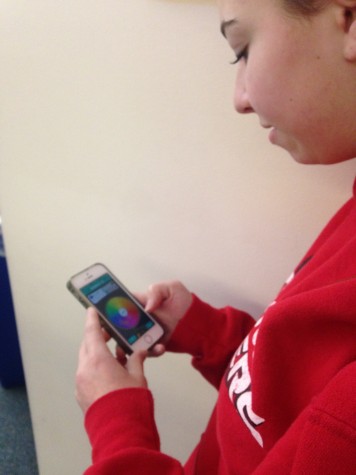Addicted to trivia
January 21, 2015
Spin the wheel and answer a question within a certain amount of time. It sounds like a game show, but it is in fact an app students can access on their smartphones. It’s called Trivia Crack.
“It’s super cool, I love that game!” said Tim Fink, junior.
The app was the most downloaded app in December 2014, according to Apple’s App Store. It was created by Etermax, a company located in Argentina, and the game was later translated to English. It is also available for Android on the Google Play store.
This game is very popular and addictive, students say. The ability to compete against your friends and strangers in a trivia game has become the new trend. “In the beginning it was addicting,” said Alex Mircea, senior.
Throughout school, all students hear is the spinning of the game wheel, and students asking their peers for the correct answer.
Students say they are up all night playing and, as soon as they wake up, they need to check if it’s their turn.
“If you’re up anyways, you might as well,” Brendan Geen, a senior, said.
The biggest issue may be that students are losing sleep for the next day. “It is fun and very addicting,” said Lauren Santaella, freshman.
Some argue that it helps students learn more information and do better in school by being quizzed on facts from numerous categories: sports, science, art, history, entertainment, and geography. Santaella enjoys playing the entertainment category best.
Students usually enjoy the category that they know the most about.
Yet Trivia Crack can cause distractions in the classroom with its sound effects; students also ask others for help and have not paid attention to lessons.
“The cell phone rule is that you are only supposed to have your cell phones out if it’s for school purposes,” said Mario Porciello, a science teacher. “Sometimes, some of us forget that and play Trivia Crack instead.”
From some students’ points of view, though, Trivia Crack is just a game. But does it actually teach anything?
“When you’re playing Trivia Crack, you are really just remembering things and it only takes you so far,” Porciello said.
Geen, however, sees Trivia Crack as a positive alternative to other smartphone games.

Freshman, Kaylie Ernst, playing her favorite app Trivia Crack during lunch
“It’s definitely more educational than some stuff you could be playing,” he said.
Mircea was a bit more equivocal about Trivia Crack purported education purposes. “I wouldn’t say you learn a lot from it but there are a couple of trivia facts that get repeated through different questions and then you will remember them,” she said.
Students can put each other to the test, challenging each other via the app.
“It’s a good way to pass time and a good way to compete with friends because there is competition involved,” Michael DeAngelis, an eighth grade student said.
Yet just like many other smartphone games, it may soon disappear from the radar.
“Its popularity has sky-rocketed, but it probably will not stay that way for long. It is just a fad and it will soon die down,” Santaella stated.
Whether students enjoy the game and play it all day or believe it takes time away from class with everyone playing it, Trivia Crack has made an impact. Just what type of impact, though, remains debatable.
“The most creative people in the world won’t just remember facts and spit them out to you. They are going to apply those facts, and apply knowledge, and create something new,” Porciello said.



